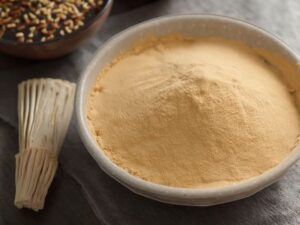RECENT POSTS
Share:
- July 10, 2025
Table of Contents
As food manufacturing demands longer shelf life, precise flavor control, and efficient logistics, soy sauce powder wholesale is gaining widespread use in commercial kitchens and industrial production. Whether used in seasoning packets, snack coatings, or dry mixes, powdered soy sauce provides a concentrated form of umami that’s easier to handle than its liquid counterpart. This guide explores key aspects of using soy sauce powder wholesale—from formulation benefits to practical applications and sourcing considerations.
1. Why Soy Sauce Powder Wholesale Is Growing in Demand
The appeal of soy sauce powder wholesale lies in its adaptability. Unlike traditional liquid soy sauce, the powdered form is lightweight, shelf-stable, and easy to portion.
Key advantages include:
- Storage efficiency: Powder doesn’t require refrigeration and has a longer shelf life.
- Low moisture content: Ideal for dry food systems and packaging that must avoid liquid ingredients.
- Controlled dosing: Measured more accurately in automated systems compared to liquid formats.
- Reduced transport cost: Lower volume and weight make large-scale logistics more economical.
These benefits make soy sauce powder especially relevant in today’s cost-sensitive and format-flexible food supply chain.
2. Key Applications of Soy Sauce Powder Wholesale
Manufacturers across sectors rely on soy sauce powder wholesale for a range of culinary and industrial uses:
- Instant noodles and meal kits: Used in seasoning sachets that mix with water to create broths or sauces.
- Dry rubs and spice blends: Adds depth and umami without introducing unwanted moisture.
- Snack seasoning: Commonly sprayed or tumbled onto chips, crackers, or roasted nuts.
- Emergency rations and travel meals: Preferred for low-weight, long-term storage needs.
- Soup bases and bouillon: Offers flavor intensity in dehydrated or cube form.
Its versatility allows consistent flavor development across dry, semi-moist, and rehydrated food categories.
3. What to Look for in Soy Sauce Powder Wholesale Quality
Not all soy sauce powders are created equal. To ensure your products meet expectations, evaluate the following:
- Flavor intensity: Powders made from naturally brewed soy sauce tend to have richer, more complex profiles.
- Carrier agents: Some powders contain starches or maltodextrin; the ratio affects both taste and solubility.
- Color and texture: A high-quality powder should be free-flowing, uniform in color, and dissolve evenly in water or oil.
- Thermal stability: Check that the flavor holds up during baking, frying, or high-heat processing.
- Salt content: Must be consistent with your nutritional or regulatory requirements.
Test batches in your production environment before scaling up to ensure full compatibility.
4. Storage and Handling in Soy Sauce Powder Wholesale Supply
Proper handling of soy sauce powder wholesale keeps quality intact during long-term storage or bulk usage.
- Moisture control: Store in sealed, moisture-proof containers to prevent clumping or microbial growth.
- Ambient stability: Most powders retain flavor and flow at room temperature if shielded from humidity.
- FIFO management: Use first-in-first-out inventory systems, even with long shelf life, to minimize oxidation risk.
- Batch integrity: Always label and track lot numbers to enable traceability and recall readiness.
These practices ensure consistent results in every use, especially in automated processing lines or distributed manufacturing networks.
5. Sourcing Considerations for Soy Sauce Powder Wholesale
When sourcing soy sauce powder wholesale, buyers should balance technical needs with documentation and logistics.
Consider the following:
- Format and packaging: 20–25kg kraft-lined bags or vacuum-sealed foil bags are common for industrial users.
- Origin transparency: Understanding the fermentation method and soybean source helps verify quality.
- Certifications: Depending on your market, you may need allergen declarations, gluten-free verification, Halal or Kosher status.
- Delivery stability: Ensure the supplier can meet demand without large variability in lead times or formulation.
Reliable sourcing lays the foundation for consistent product quality and regulatory compliance in finished goods.
Conclusion
The rise of soy sauce powder wholesale reflects broader shifts in food production—toward portability, shelf stability, and ingredient efficiency. For businesses across foodservice, packaged meals, or snack manufacturing, powdered soy sauce offers a functional and scalable solution to umami flavoring. By focusing on quality evaluation, usage compatibility, storage care, and supply chain consistency, manufacturers can confidently integrate soy sauce powder into modern product lines.
Whether enhancing broth depth or creating shelf-stable seasonings, soy sauce powder has become an indispensable ingredient in today’s industrial kitchen.
0


